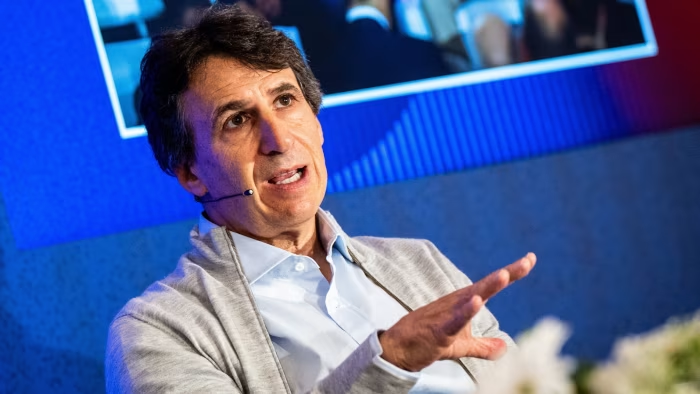- Calcium Supplements and Dementia: Major Study Busts Long-Held Myth SciTechDaily
- Do daily calcium supplements affect dementia risk? MedicalNewsToday
- Study finds no link between calcium intake and dementia | Tap to know more | Inshorts Inshorts
Blog
-
Calcium Supplements and Dementia: Major Study Busts Long-Held Myth – SciTechDaily
-

Samsung Electronics Ranks 5th in Global Brands for the Sixth Consecutive Year – Samsung Global Newsroom
Samsung recognized for AI leadership and accelerating adoption
Samsung Electronics today announced it has been recognized by Interbrand, a global brand consultancy, as the 5th-ranked global brand for the sixth year in a row. Interbrand releases its list of “Best Global Brands” each year. For this year’s list, Samsung recorded a brand value of $90.5 billion, upholding its position as the only Asian company to remain in the global top five since 2020.
According to Interbrand, Samsung Electronics’ evaluation was positively influenced by:
- Strengthened AI competitiveness across the company’s business divisions
- Enhanced customer experiences through unified integration across products
- Focused investment in AI-related semiconductors
- Execution of a customer-centric brand strategy
“Through AI innovation and open collaboration, Samsung has worked to ensure that more customers can experience AI in their daily lives,” said Won-Jin Lee, President and Head of Global Marketing Office at Samsung Electronics. “Moving forward, we will continue to focus on benefits for customers including in health and safety so that Samsung can grow into an even more beloved brand.”
Under the vision of “Innovation for All,” Samsung consistently strives to make AI accessible to more customers worldwide.
This year, Samsung reinforced its leadership in mobile AI with the continued advancement of Galaxy AI, aiming to make it available on 400 million devices within the year driving the democratization of AI. In Consumer Electronics (CE), Samsung has expanded AI competitiveness by introducing AI technologies tailored to each product category, such as Vision AI and Bespoke AI.
Through open collaboration with diverse partners, Samsung has enhanced personalized AI experiences for customers, while also providing industry-leading security with Samsung Knox.
In semiconductors, Samsung has been addressing the growing demand for AI with a comprehensive portfolio across cloud, on-device and physical AI. This includes actively responding with advanced products including HBM, high-capacity DDR5, LPDDR5X and GDDR7.
Beyond AI, Samsung continues to enhance the accessibility of its products and services and drive sustainable innovation across all business divisions. This includes energy savings through energy-efficient appliances connected via SmartThings.
Samsung’s Recognized Efforts in Each Business Division
Mobile
- Leading the mobile AI era and driving the popularization of AI with Galaxy AI
- Strengthening foldable category leadership with the launch of Galaxy Z Fold7 and Z Flip7
- Enhancing customer trust through strengthened privacy and security technologies
- Expanding health services through advanced wearables, Samsung Health enhancements and open collaboration
Networks
- Reinforcing leadership in AI-powered virtualized Radio Access Networks (vRAN) and Open RAN
- Consistently innovating technologies to support various 5G use cases, including high quality streaming and gaming
- Leading the technical standardization of 6G
- Enhancing partnerships with customer companies and communicating the sustainability aspects of Samsung’s network technology
Visual Display
- Solidifying global leadership in TVs, soundbars and gaming monitors
- Innovating viewing with rich AI features based on Vision AI
- Enhancing The Frame and Art Store services to deliver personalized art TV experiences
- Expanding content offerings through partnerships in TV Plus, entertainment, gaming and music
Digital Appliances
- Maintaining global leadership in categories such as refrigerators and washing machines through consistent product innovation and advanced AI capabilities
- Providing differentiated convenience and advanced AI experiences through SmartThings integration
- Expanding Bespoke AI appliance leadership across energy efficiency, usability, performance and design
Semiconductor
- Operating a diverse portfolio across cloud, on-device and physical AI applications
- Maintaining leadership in mobile and automotive semiconductors, including DDR, SSD, LPDDR, UFS and Auto SSD
- Continuing development and investment in innovative solutions like CMM-D and HBM
- Sharing vision and industry leadership through influential tech events
Interbrand’s Best Global Brands are ranked based on brand value evaluation, which involves a comprehensive analysis of the company’s financial performance and outlook, the influence of the brand on customer purchases and brand competitiveness (including strategy, empathy, differentiation, customer engagement, consistency, trust and more). The ranking is one of the world’s longest-standing brand value evaluations, widely recognized for its credibility.
Continue Reading
-

OPPO ColorOS 16 Set for Global Unveil: A New Era of Smoothness, Intelligence, and Seamless Connectivity
SHENZHEN, CHINA –
Media OutReach Newswire – 15 October 2025 – OPPO has revealed its first look at ColorOS 16, the latest version of its mobile operating system, launching with the upcoming Find X9 Series. The update sets a new…Continue Reading
-

Overdose in America – a Guardian Series |
This series is supported through philanthropic funding to theguardian.org, a US-based foundation that partners with the Guardian on independent editorial projects.
All of the journalism is editorially independent, commissioned and produced by our…
Continue Reading
-

Grimes’ Co-Creative Director Launches Sci-Fi-Inspired Beauty Brand
The creative mind behind the multi-hyphenate musician Grimes is bringing his signature fantasy aesthetic to the beauty world.
The musician’s co-creative director Bryan Huynh, as well as co-founders David José and Mollie Gloss, announced the…
Continue Reading
-

How to Enable and Customize Apple Intelligence Priority Notifications
If you get a lot of iPhone notifications from social media apps, messages from friends and family and news alerts, you might feel overwhelmed. But if you have an Apple Intelligence-enabled iPhone, like the iPhone 15 Pro, Pro Max, the iPhone 16…
Continue Reading
-

Hyundai Motor Achieves Record Brand Valuation of $24.6 Billion in 2025 Interbrand Rankings
Daehyun Shin
daehyun.shin@hyundai.com
Global Strategy & Planning · Hyundai Motor CompanyDisclaimer: Hyundai Motor Company believes the information contained herein to be accurate at the time of release. However, the company may upload new or updated information if required and assumes that it is not liable for the accuracy of any information interpreted and used by the reader.
About Hyundai Motor Company
Established in 1967, Hyundai Motor Company is present in over 200 countries with more than 120,000 employees dedicated to tackling real-world mobility challenges around the globe. Based on the brand vision ‘Progress for Humanity,’ Hyundai Motor is accelerating its transformation into a Smart Mobility Solution Provider. The company invests in advanced technologies such as robotics and Advanced Air Mobility (AAM) to bring about revolutionary mobility solutions while pursuing open innovation to introduce future mobility services. In pursuit of a sustainable future for the world, Hyundai will continue its efforts to introduce zero-emission vehicles with industry-leading hydrogen fuel cell and EV technologies.
More information about Hyundai Motor and its products can be found at:
https://www.hyundai.com/worldwide/en/ or Newsroom: Media Hub by Hyundai
Follow our Hyundai Global Newsroom Instagram channel @hyundai_mediahub
Continue Reading
-

Top US financiers sound alarm on lending standards
Unlock the Editor’s Digest for free
Roula Khalaf, Editor of the FT, selects her favourite stories in this weekly newsletter.
Top US financiers have warned of an erosion in lending standards after credit markets were shaken by the collapse of First Brands Group and Tricolor Holdings.
Apollo Global Management chief executive Marc Rowan said the unravelling of the two businesses followed years in which lenders had sought out riskier borrowers.
“It does not surprise me that we are seeing late-cycle accidents,” Rowan said on Tuesday. “I think it’s a desire to win in a competitive market that sometimes leads to shortcuts.”
Last month’s failure of First Brands and subprime auto lender Tricolor has reverberated across credit markets and left investors such as Blackstone and PGIM, as well as major banks including Jefferies, nursing heavy losses.
It has also prompted further scrutiny of the private capital industry and the lack of transparency around borrowers, which tend to be highly levered with debt.
“In some of these more levered credits, there’s been a willingness to cut corners,” Rowan told the Financial Times Private Capital Summit in London.
Both Rowan and Blackstone president Jonathan Gray pointed the finger at banks for having amassed exposure to First Brands and Tricolor, but said the collapses were not signs of a systemic issue. “What’s interesting is both of those were bank-led processes,” Gray told the same FT conference, rejecting “100 per cent” the “idea that this was a canary in the coal mine” or a systemic problem.
Far from championing First Brands, Apollo went so far as to build a short position against debt linked to the group prior to its collapse, meaning it would profit if the company failed to repay loans. “Most of the announced holders of risk are, in fact, financial institutions,” said Rowan.
Banks and private capital firms have been at odds in recent years as businesses have increasingly turned to private credit for their borrowing needs. Traditional lenders have labelled the shift regulatory arbitrage and complained that non-bank financial institutions are too lightly regulated.
But First Brands and Tricolor have exposed how both sides are intertwined through complex financial structures that can obfuscate who holds the underwriting risk, especially as bank lenders aim to maintain their market share.
JPMorgan Chase chief executive Jamie Dimon echoed some of the concerns on Tuesday as the bank reported strong earnings that were marred by a $170mn hit from Tricolor’s collapse.
“My antenna goes up when things like that happen. I probably shouldn’t say this but when you see one cockroach there are probably more,” he said. “There clearly was, in my opinion, fraud involved in a bunch of these things, but that doesn’t mean we can’t improve our procedures,” he added, acknowledging that the Tricolor exposure “was not our finest moment”.
Meanwhile, the IMF on Tuesday called for regulators to focus on bank exposure to the sector, noting that “banks are increasingly lending to private credit funds because these loans often deliver higher returns on equity than traditional commercial and industrial lending”.
Continue Reading
-

Pupils fear AI is eroding their ability to study, research finds | Artificial intelligence (AI)
Pupils fear that using artificial intelligence is eroding their ability to study, with many complaining it makes schoolwork “too easy” and others saying it limits their creativity and stops them learning new skills, according to new research.
The report on the use of AI in UK schools, commissioned by Oxford University Press (OUP), found that just 2% of students aged between 13 and 18 said they did not use AI for their schoolwork, while 80% said they regularly used it.
Despite AI’s widespread use, 62% of the students said it has had a negative impact on their skills and development at school, while one in four of the students agreed that AI “makes it too easy for me to find the answers without doing the work myself”.
A further 12% said AI “limits my creative thinking” while similar numbers said they were less likely to solve problems or write creatively.
Alexandra Tomescu, OUP’s generative AI and machine learning product specialist, said the study was among the first to look at how young people in the UK were incorporating AI into their education.
“The thing I find fascinating is how sophisticated the answers are,” Tomescu said. “For 60% of students to say they are concerned that AI tools encourage copying rather than doing original work, that’s a very deep understanding of what your schoolwork is meant to help you do, and what the pitfalls and benefits are associated with this technology.
“Young people who are using this technology actually have a pretty sophisticated, quite mature understanding of what the technology does in relation to their schoolwork, which is fascinating because we don’t give young people enough credit when it comes to using technology in an educational space, unaided, in this way.”
OUP’s findings follow empirical studies on the use of AI in education. One published this year by the Massachusetts Institute of Technology (MIT) measured brain electrical activity during essay writing among students using large language models (LLM) such as ChatGPT, and concluded: “These results raise concerns about the long-term educational implications of LLM reliance and underscore the need for deeper inquiry into AI’s role in learning.”
Nearly half of the 2,000 students surveyed by OUP said they were worried their classmates were “secretly using AI” for schoolwork without their teachers being unable to spot it.
Many reported that they wanted more help from teachers for the appropriate use of AI and in judging whether its output was reliable. OUP said it is launching a new AI education hub aimed at supporting teachers.
“Some of these findings will be very interesting for teachers, especially around how much students are expecting guidance from teachers. We sometimes think there is a technological generational divide, and yet they are still looking at their teachers for guidance in how to use this technology productively, and I find that very positive,” Tomescu said.
Daniel Williams, an assistant headteacher and AI lead at Bishop Vesey’s grammar school in Birmingham, said: “The findings closely reflect what I see in school. Many pupils recognise AI’s value for creativity, revision, and problem-solving but often use it as a shortcut rather than a learning tool.”
Just 31% said they didn’t think AI use had a negative impact on any of their skills. But most students said using AI helped them gain new skills, including 18% who said it helped them understand problems, and 15% said it helped them come up with “new and better” ideas.
Asked to elaborate, one 15-year-old female student said: “I have been able to understand maths better and it helps me to solve difficult questions.”
Meanwhile, a boy aged 14 claimed: “I now think faster than I used to.”
Continue Reading
-

Mission to Mars: The new space race
US President Donald Trump wants to “plant the stars and stripes on the planet Mars”. But more than 50 years on from the moon landings, America’s space agency, Nasa, is in disarray. Meanwhile, China is forging ahead with its own plans for…
Continue Reading